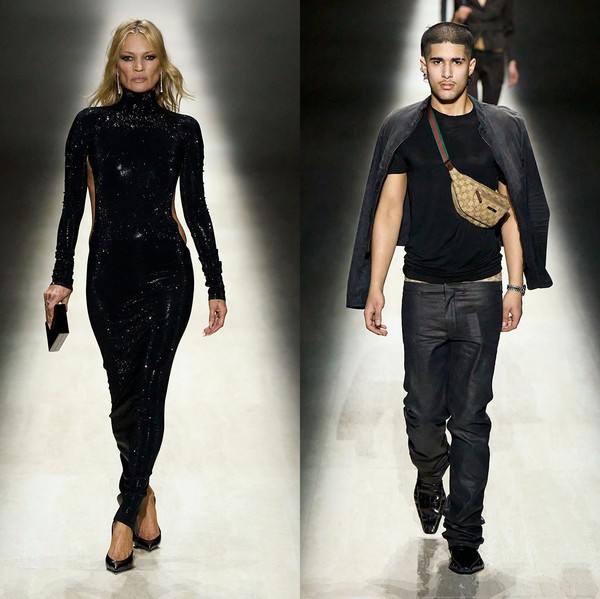The Language of Disgust: From Cringe to Ick
Disgust is a universal human emotion. Below, we explore the spectrum of cringe to ick and the way these terms are rooted in the zeitgeist.

If you frequent the comedy scene in Los Angeles, you’re an honorary cringe anthropologist. Over the years one develops a sixth sense for detecting the perpetrators on sight; if I see a man cradling an acoustic guitar waiting his turn at a comedy mic, it takes all my willpower not to pull the fire alarm right then and there. To alleviate the tedium of stand-up mics, I invented a little game I play in my head to pass the time: I call it “straight guy bingo." You get a point every time a man mentions: masturbating, 9/11, dating apps, WWII, or how dumb girls are for liking astrology. Double points if they pantomime humping the stool or pretending the mic is a dick. You win bingo automatically if they tell a story that involves masturbating and 9/11—and yes, this happens more often than you’d think. It helps me stay afloat in the maelstrom of bad jokes, but, try as I might, I can never fully outrun the cringe.
We’ve all experienced the cringe of bad jokes in our everyday lives. Imagine: you’re meeting your new partner's high school friends, then all of a sudden, there it lands: a tactless joke told with a bravado of a man too self-assured to deem any of their ideas “bad.” The cadence suggests we’ve arrived at a punchline, but there is no laughter. It hangs out there without punctuation. You can feel your stomach tighten in unison with the rest of the group. What was supposed to be a laugh sours into cringe reflux in the back of your throat—for some, it triggers an audible groan.
The industry term for this is “losing the crowd.” There are lots of subtle ways to lose a crowd. Maybe a joke isn’t offensive, but too predictable. The crowd sees the ending so far in advance that by the time a punchline arrives, it feels redundant. We call those jokes “hack.” Yes, men in their 20s don’t have bed frames—we’ve heard that one before, Ashley. Whether it’s boldly offensive or simply predictable, when a joke aims to connect and falls short, we cringe.
Some prefer the term “second-hand embarrassment,” and while it is apt in some cases, it fails to cover the spectrum that cringe offers. Second-hand embarrassment is an emotion I feel for my friends, but when a guy tells the same poorly-received offensive joke at three different open mics, I get the hunch he’s not all too embarrassed about it. Cringe seems to move freely on the spectrum between embarrassment and disgust. That’s why it works so well as both a verb and a noun. Naming something as “cringe (n.)” is a label; a stamp divorced from the feeling itself. You can dismiss things as cringe with the flick of a wrist: skinny jeans, comic sans, Coldplay. There are levels of cringe that involve compassion, but it can also serve as a condemnation synonymous with anything from “unfashionable” to “pathetic.”
While cringe is in the eye of the beholder, one thing is usually true about the cringee: they are not aware of the cringe that they have inflicted. Hear me out. If someone does something embarrassing (i.e., gets a pie in the face) and they are immediately embarrassed (i.e., humiliated by the pie), that isn’t cringe. Why? It’s embarrassing, but they know it. Now let’s say something embarrassing happened and they don’t know it—someone drew a dick on their face when they were blackout drunk. They wake up, unaware of what is embarrassing, but that isn’t cringe either. Why? Because they are not responsible for what happened. Cringe necessitates their behavior is intentional, yet they are unaware of the cringe they are afflicting upon delivery. The joke is on you. We are laughing at you, not with you. It explains why a middle school photo of yourself is cringe—the person you were in the photo is unaware of the fashion crimes they were committing at that moment.
Aside from the cringee’s unawareness of their faux-pas, cringe relies on a failure to “hit the mark.” At the moment the cringe occurs, the one who is about to commit said crime is aiming for something different: art, meaning, laughter, connection. We see them reaching for a goal. There is a swing and a miss. The only problem is they don’t see the miss. They struck out and ran through the bases anyways. It’s like that moment in a cartoon where the coyote runs off the cliff and keeps running, not noticing there’s no more land. It’s the misplaced confidence in that moment that causes the audience to cringe. My favorite genre of cringe is men making thirst traps on TikTok. Shirtless men eye-fucking their ring lights. Teenage boys play-acting badly written scenarios where they are a hero to an imaginary adolescent damsel. The lip-licking, the offbeat lip-syncing, the muscle flexing—the gulf between the humiliating content and their unbridled confidence causes us to cringe.
Perhaps surprisingly, there has already been a philosophical exploration of the comedic gulf between intention and execution. In a 1900 essay titled “Laughter” by French philosopher Henri Bergson, he very humorlessly breaks down a few bare elements of comedy. He uses the example of a man running down the street, tripping, and falling. Bergson writes, “Passers-by burst out laughing. They would not laugh at him, I imagine, could they suppose that the whim had suddenly seized him to sit down on the ground. They laugh because his sitting down is involuntary.” The author focuses on the moment when the man is falling, but his body is still going through the mechanical process of walking. “The muscles continued to perform the same movement when the circumstances of the case called for something else.” He calls this our “mechanical inelasticity.” In 1900, he was inadvertently describing the type of “cringe comedy” that would explode in popularity 100 years later. Cringe comedy is at the core of shows like The Office, Parks and Rec, or Curb Your Enthusiasm, all centered on characters that proceed clumsily, driven mechanically by their willpower, and unaware they are striving for a goal they will fail to achieve.
While we’re examining cringe culture, let’s take a moment to introduce its first cousin, “the ick.” When something “gives you the ick,” it is not so far from cringe—you feel a pang of disgust or discomfort with someone’s behavior. Popularized by the UK dating show Love Island, ick is most often used when getting to know a potential suitor and noting behaviors that are “turn-offs.” For example, a man wearing socks and sandals could give you the ick. Texting the word “hehe” can give you the ick. On a Reddit thread of people explaining what gives them this particular feeling, someone said, “Seeing a man run to catch the train gives me the ick.” The difference between ick and cringe is that ick is entirely subjective. While cringe taps into a universal human response, “ick” is oftentimes just a way to dismiss a person’s mannerisms, habits, or appearance as “disgusting.” The subjective nature of ick makes it a more sinister trend than “cringe” in our cultural lexicon. One girl on TikTok cited that “watching her man look for his glasses gave her the ick.” Sorry man, guess your desire to see was gross. Tough luck.
Ultimately, disgust is a universal human emotion. Alongside fear, anger, happiness, etc., disgust is a tenet of human communication. Evolutionarily, disgust sent a powerful message to our fellow cavemen—whatever you are smelling, seeing, tasting, or feeling is gross! It could harm you, poison you, or threaten your livelihood. We are rarely in mortal peril in modern society, but disgust is as powerful as ever. In a social society, it isn’t our lives but our social capital that is at stake. This explains why we have stage fright or social anxiety. Preserving our social standing has supplanted that basal survival instinct. It is the reason the comedy world has such violent terminology—“you killed,” “bombed,” “flopped.” The stakes feel like life or death. In a sense, that feeling is correct. The setting has changed, but the physiological response endures.
While most people avoid being cringe like the plague, it can be a powerful tool for self-actualization. If you look back at your middle school photos and don’t cringe, then you probably still overpluck your eyebrows. Cringe implies growth. I may look back on this essay in a year and cringe very deeply. The term cringe will be outdated and cheugy. Cheugy may even be too cheugy a word at this point in the zeitgeist. The landscape is constantly shifting and for good reason. Cringe may feel life-or-death, but “bombing” can be transformative. You learn that not only will you live through it, but now you’re getting closer to something that does work. Not all ideas are good ideas, but as FDR said, “The only thing that’s cringe is cringe itself.” That being said, for the love of god, please leave the acoustic guitars at home.




